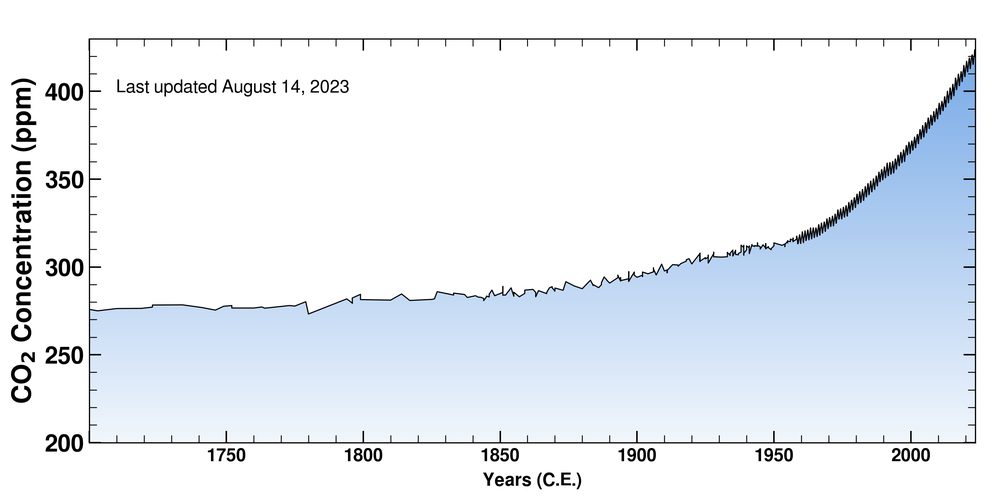Sign up for the weekly Climate on the Ballot newsletter.
Every Monday, in “Climate on the Ballot,” we pass along a topic to help you integrate climate into your newsroom’s campaign reporting. Consider sharing this newsletter with your colleagues on the politics beat. Vea la versión en español de “El clima en la boleta.”
This Week: Climate Denial & Disinformation
The number of Americans who say that global warming is happening now outnumber those who don’t by nearly five to one (72% versus 16%). If only members of Congress reflected their constituents.
According to a 2021 report, just over 28% of people serving in Congress deny the science of human-caused climate change — 139 elected officials, including 109 representatives and 30 senators. That’s nearly twice the number of climate skeptics as the general public. With the current Republican House majority, that number has likely risen, and it includes House Speaker Mike Johnson, who has said he doesn’t believe that burning fossil fuels is changing the climate and has voted against every climate bill put before him during his seven years in Congress. Not one Republican in Congress voted for the Inflation Reduction Act, the Biden administration’s landmark bill to combat climate change.
Given that chasm, between what voters say they believe and the elected officials who are supposed to represent them, it can’t be a surprise that disinformation efforts around climate are surging this election year. That puts the onus on journalists to help their audiences sift through what is real and what isn’t — with a key climate election hanging in the balance.
Reporting Ideas
- Ask candidates what they will do about climate change. Do not ask candidates whether they “believe” in climate change. Such “both-sides” framing implies that climate science is in doubt. It isn’t. Instead, interrogate how candidates plan to stop climate change and push them to square those plans with what science calls for: a rapid phaseout of oil, gas, and coal.
- Call out the use of disinformation on the stump. As CCNow has detailed in this resource, a lot of climate disinformation comes from coordinated campaigns orchestrated by bad actors who will benefit from delaying climate action. If a candidate is touting solutions that sound dubious, check their funding and ask them about it.
- Highlight the sponsors of bills aimed at slowing or stopping climate change. In addition to voting against climate action bills, climate deniers in Congress have been writing bills to repeal various sections of the Inflation Reduction Act. Climate Power has a helpful tracker where you can review the bills, sponsors, and votes.
- Are candidates politicizing climate solutions and actions to fire up voters? Donald Trump’s former energy advisor Mike McKenna told The New York Times that “polling has found attacking electric vehicle mandates to be an ‘amazing’ issue for the party.” Former president Trump often repeats lies about EVs at his rallies to stoke anger about the Biden administration’s climate policies.
Take Inspiration
- Fossil gas fuel production in the US has ramped up in recent years. The Washington Post wrote last year about how dark money groups led Ohio legislators to codify a law that redefines fossil gas as “green energy,” which it isn’t.
- Earlier this month, the Florida state legislature delivered a bill to Governor Ron Desantis’s desk “that amends Florida statutes to delete all references to climate change.” Florida Phoenix political opinion writer Diane Roberts quipped, “We can now stop worrying about the planet: FL Legislature has written climate change out of the law.”
- A new Brown University report found “pervasive disinformation in Congress about offshore wind” by conducting word searches of the 118th congressional proceedings. “What surprised me was how much of the belief in disinformation seemed to be genuinely held by members of Congress,” the report’s lead author, researcher Isabella Garo, told CleanTechnica.
- Sierra Magazine recently published a comprehensive look at anti-wind and solar campaigns fueled by misinformation happening across the US. “Deepening political polarization, fueled by social media, has helped transform renewable energy into a culture-war issue — and extended the reach of its most ardent opponents.”
Spotlight Piece
“Polls show Trump winning key swing states. That’s partly a failure of the press,” writes Margaret Sullivan in the Guardian. “Polls can’t predict. But they can warn. And maybe a red-alert warning is what low-information Americans — and our horse race-obsessed media — need most of all.”



